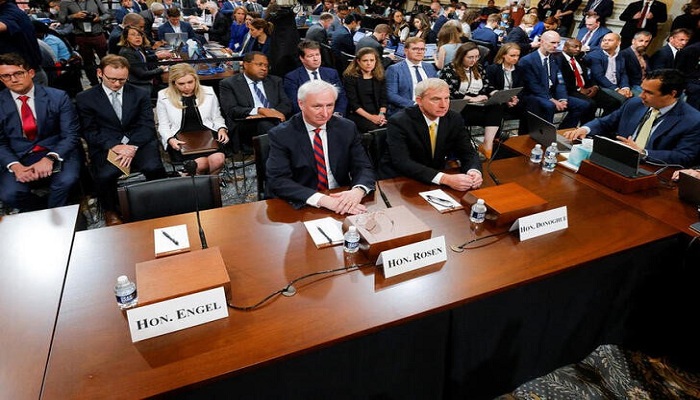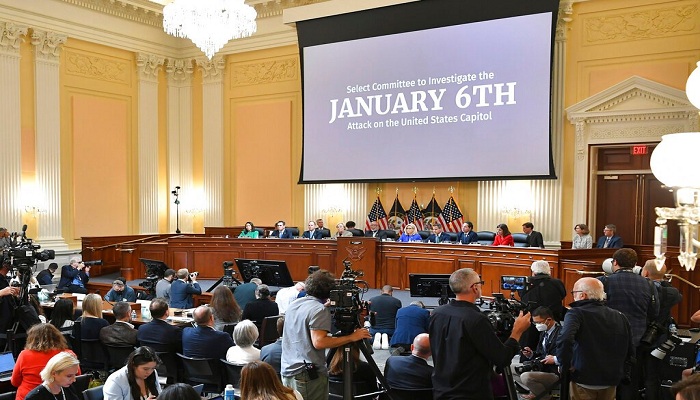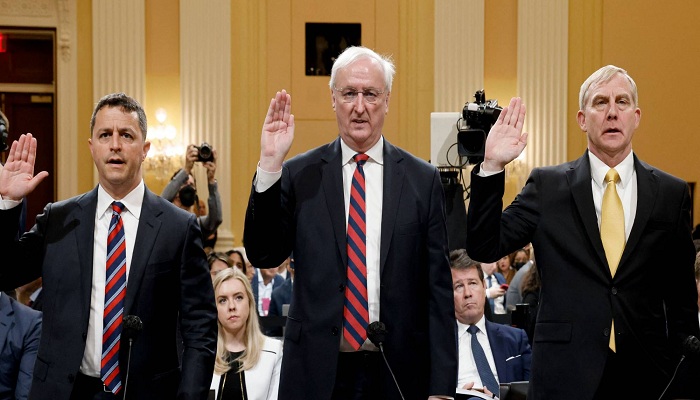At least five congressional Republican allies of Donald Trump sought pardons after supporting his attempts to overturn his 2020 election defeat.
Their names emerged at the end of a fifth day of hearings that focused on how the then-president pressured top Justice Department officials daily in his final weeks in office to help him illegally hold onto power.
Trump sought to replace Acting Attorney General Jeffrey Rosen with Jeffrey Clark, a Justice Department environmental lawyer and staunch supporter of Trump’s false claims that his defeat was the result of widespread fraud.
That move was headed off only when most of the rest of Justice Department leadership threatened to resign en masse if Trump carried it out.
Polish writer charged over comments on Biden and US election outcome
“The president didn’t care about actually investigating the facts. He just wanted the Department of Justice to put its stamp of approval on the lies,” Representative Adam Kinzinger, a Republican committee member, said at Thursday’s hearing.

The committee heard from Rosen, his then-acting Deputy Attorney General Richard Donoghue and former Assistant Attorney General for the Office of Legal Counsel Steven Engel, who testified in person, and screened video testimony from other Trump White House aides.
That video testimony showed that Republican Representatives Andy Biggs, Mo Brooks, Matt Gaetz, Louie Gohmert and Scott Perry sought pardons from Trump, which could have inoculated them against prosecution for any activities they may have engaged in before or during the Jan. 6 riot at the Capitol.
Republican Representative Jim Jordan, an outspoken defender of Trump, inquired at the White House about pardons but never asked for one for himself, said Cassidy Hutchinson, an aide to then-White House Chief of Staff Mark Meadows.
Democratic presidential candidate predicts Trump will try to postpone US election
Brooks acknowledged he did seek a pardon, saying he was concerned Democrats would “abuse the judicial system by prosecuting and jailing Republicans.” In separate statements, Perry, Gohmert and Biggs denied seeking pardons. Gaetz did not respond to a request for comment.
Trump never acted upon those pardon requests.
Rosen said in the days leading up to Jan. 6, 2021, when Congress met to formally certify Democrat Joe Biden as the next president, Trump repeatedly “asserted the Department of Justice had not done enough” to investigate false allegations that the election had been “stolen” through voter fraud.
“Between Dec. 23 and Jan. 3, the president either called or met with me virtually every day, with one or two exceptions such as Christmas Day,” Rosen testified.

Donoghue testified that Trump had said to Justice Department officials: “What I’m just asking you to do is say it was corrupt and leave the rest to me and the Republican congressmen.”
Former U.S. Attorney General Eric Holder, who served under Trump’s Democratic predecessor, Barack Obama, tweeted: “This is the smoking gun. Coupled with other testimony demonstrates both Trump’s substantive involvement and corrupt intent, requisite state of mind.”
Ex-Justice Department officials cast Clark as incompetent and unqualified to head the Department of Justice as he pushed recommendations they said would be disastrous.
Trump repeating previous election strategy to win again
Clark also pressured Donoghue and Rosen to send a letter to lawmakers in Georgia falsely claiming that the Justice Department had “significant concerns” about the legitimacy of Biden’s victory in the state and echoing Trump’s false claims of voting fraud. They both refused.
Biden won both the popular vote and Electoral College vote by wide margins.
Donoghue said that during an early January meeting Trump was warned of “hundreds and hundreds of resignations” if Clark were to take over as head of the agency. “The leadership would be gone. Jeff Clark would be leading a graveyard.”
The hearing kicked off shortly after it was disclosed that federal law enforcement had raided Clark’s home.
Russ Vought, the former director of the U.S. Office of Management and Budget who recently hired Clark to work for his legal advocacy group Center for Renewing America, confirmed the raid of Clark’s home on Twitter.
He said more than a dozen federal law enforcement officials searched Clark’s house in a pre-dawn raid, “put him in the streets in his pjs, and took his electronic devices.”
The U.S. Attorney’s Office confirmed there was law enforcement activity on Wednesday in the Lorton, Virginia, suburb of Washington near where Clark lives, but declined to elaborate.
Clark provided a deposition to the select committee, and the committee showed excerpts of it in which he repeatedly invoked his legal right not to answer questions. On Twitter earlier this year, Clark called himself “one of the top targets of the politically motivated J6 committee.”
Facebook considers political-ad blackout ahead of US election
The Justice Department is investigating whether there was a plot to advance alternative slates of fake electors in battleground states with the goal of overturning the election result.
According to one subpoena seen by Reuters that is focused on the phony slate of electors in Georgia, investigators are seeking copies of documents from October 2020 related to “any effort, plan or attempt to serve as an elector in favor of Donald J. Trump and/or (Vice President) Mike R. Pence.”
They also are seeking copies of communications between would-be electors and any federal government employees, as well as communications involving Trump allies, including lawyers Giuliani and John Eastman.
In a fiery speech outside the White House on Jan. 6, Trump repeated his false claims of election fraud. His supporters stormed the Capitol, sending lawmakers and Pence fleeing for their lives.
Four people died on Jan. 6, one shot by police and the others of natural causes. Some 140 police officers were injured, and one who fought rioters died the next day. Four officers later died by suicide.



